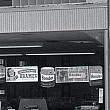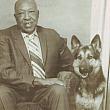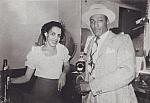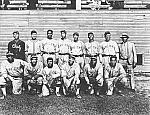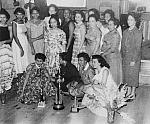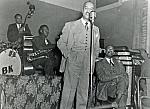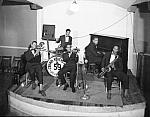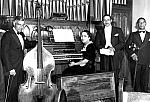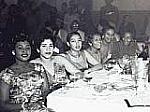
Beginning of Roma Hall
by Kim Rush, John Russo, and Martin Starr
G.B.’s daughter Rose, a dancer, was so enamored with her father’s new business venture that she quit school to work at Roma Hall in the 1930s. Eventually, Rose helped run the rental hall and grocery business. While attending college, G.B.’s son Frank also worked at Roma Hall during breaks and in the summer. G.B’s youngest brother Joe worked there, as a drummer and a bouncer. John’s uncle, Paul Russo, recalls using sawdust to sweep the Roma Hall floor after the crowds had left.
Jennie, G.B.’s youngest daughter, states that the family apartment was located next to the dance hall, and as a child she would watch and listen to the musicians and the crowds who attended events at Roma Hall. “People attending functions at the hall never told us kids to leave. They didn’t care. They let us watch the floorshows! My mother would stay behind the cash register at Roma Hall. The waitresses would bring her money and she would provide change for them.”
Jennie also remembers the constant noise from the streetcars (later replaced by buses) on Division Avenue and the sounds of the dance hall as being “music to her ears.” All members of the family eventually became accustomed to these sounds. The racket produced by the streetcars was so loud that you could not conduct a phone conversation until they moved further down the street. The music and street sounds did not faze us. We had to get some sleep! Coincidentally, only one telephone was located in the family apartments for many years. There was an opening in the floor so that the phone could be lowered to the store below to save a trip upstairs.
Roma hall and grocery store were thriving businesses, but were closed on Sunday. The only time that the Russo family could sit down and enjoy a meal together was on Sunday after church. Customers would still knock on their door on Sunday, desiring to pick up items from the store. G.B. and Jenny were willing to go downstairs and help them purchase what they were after. Typically, on Sunday afternoons, G.B. would also keep busy delivering groceries to surrounding communities by horse drawn wagon in the early days, and eventually by car or truck.
While he was still a boy, Paul Russo helped in the store in the early 1940s. Although this chronology is fast-forwarded a bit, his recollections of the store are significant: “it was relatively narrow but very deep. I spread sawdust on the floor and swept it up to keep the dust down and keep it nice and clean. There were many bottles in the store. There were large barrels of two types of olives. There was pepperoni for sale, and cheese hung from the ceiling in the display windows. Bulk olive oil was sold in five-gallon containers or poured off into other containers for smaller orders. G.B. also sold dried fish, provolone cheese and tomato paste. He did not sell wine in those early days.”
The family worked hard and put in long hours. There was a kitchen with a sink, stove and round table in an area behind the store, and family members would “eat there in shifts,” while the others kept busy working in the store.

 facebook
facebook